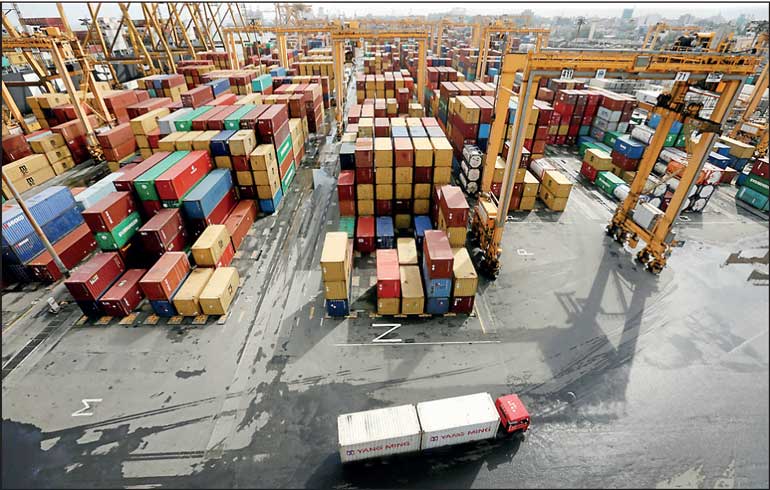Monday Feb 16, 2026
Monday Feb 16, 2026
Monday, 13 February 2023 00:20 - - {{hitsCtrl.values.hits}}

 In the absence of a competition act in Sri Lanka for international trade, Sri Lankan exporters, importers and traders are constantly subject to various attempts by a section of the services sector to introduce anti-competitive practices to manipulate market driven prices. It is observed that the authorities are clueless in addressing the same and most of the time are taken on a ride by interested parties bringing in protectionism against competition which I have been writing for well over 20 years. The Government must realise that this harassment constantly comes on the real foreign exchange generating industries of Sri Lanka and the consumer at large.
In the absence of a competition act in Sri Lanka for international trade, Sri Lankan exporters, importers and traders are constantly subject to various attempts by a section of the services sector to introduce anti-competitive practices to manipulate market driven prices. It is observed that the authorities are clueless in addressing the same and most of the time are taken on a ride by interested parties bringing in protectionism against competition which I have been writing for well over 20 years. The Government must realise that this harassment constantly comes on the real foreign exchange generating industries of Sri Lanka and the consumer at large.
Brief insights
In India, the Competition Act of 2002 was enacted by the parliament of India and governs Indian competition law. It replaced the archaic Monopolies and Restrictive Trade Practices Act of 1969. Although Sri Lanka has been an open economy since 1977 consecutive governments have failed to address this issue and are still stuck on laws of the 60s and 70s and try to address international issues by introducing patches.
As a result, many monopolistic and restrictive trade practices are in place in international trade in Sri Lanka. The country has failed to adapt reforms to fit the new technology and modern trading environment, even the best practices recommended by the International Chamber of Commerce (ICC Paris) for transportation have been overlooked and factually the country has become a more closed economy in many verticals than when we started the new millennium.
Exporters and importers have been the victims of this anti-competitive environment and have had to fight continuously to safeguard competition in pricing and tariffs. At the rate the ministers, secretaries and heads of institutions have been rotating there has been no stability in policy and lacks a professional approach to make the country a legally strong destination to be a modern trading, logistics and a manufacturing hub for the last two decades. This is why the National Export Strategy (2018) has become a dead document even though the president wants it activated.
Competition law has been described in the Wikipedia as follows, quote “Competition law is the field of law that promotes or seeks to maintain market competition by regulating anti-competitive conduct by companies. Competition law is implemented through public and private enforcement. It is also known as antitrust law, anti-monopoly law, and trade practices law.
The history of competition law reaches back to the Roman Empire. The business practices of market traders, guilds and governments have always been subject to scrutiny, and sometimes severe sanctions. Since the 20th century, competition law has become global. The two largest and most influential systems of competition regulation are United States antitrust law and European Union competition law. National and regional competition authorities across the world have formed international support and enforcement networks.” End quote
International Trade Office (ITO)
I welcome the proposal of an International Trade Office ITO to be established on President’s directions to synergise the country’s external trade, it is paramount that this office takes serious note of the absence of a powerful competition act in Sri Lanka. It is understood that the ITO is to coordinate the activities of all the relevant institutions including the department of commerce to obtain maximum output from the external trade sector to the National Economy to be competitive.
We find that many institutions are infiltrated by people with vested interest included in the decision making and data sharing board of directors in Government. In shipping and logistics sectors some of the local arrangements that have been designed to favour a few over the years which in technical terms violate anti competition laws of the USA and Europe, which are our key export markets. They also continue to promote anti-competitive pricing practices in Sri Lanka making exports uncompetitive and imports more expensive for the consumer.
Whenever laws are brought to restrict anti-competitive practices, some who have vested interest who are mainly commission earners or middlemen mislead officials who have no legal, commercial background, or an understanding of international laws and they try to violate the fundamental laws of competition to make their way to satisfy individuals. I have witnessed this not only in the services sector but in the manufacturing, supply chains as well. Simply a professional independent regulator is missing in the key area of international trade in Sri Lanka.
The way forward
Globally all successful free economies have strong regulatory bodies, right now the US Federal maritime commission is very active in the eyes of unfair charges in the logistics sector during the COVID-19 pandemic by some service providers. President Biden himself intervened on these matters. The FMC website says, quote “The Federal Maritime Commission is responsible for regulating the US international ocean transportation system for the benefit of US exporters, importers, and the US consumer.” Unquote.
I question the Lankan Government is this happening in Sri Lanka by any authority with proper knowledge? Or is it the other way around that it works to help the middleman? Consumer authority is weak in Sri Lanka, the fair-trading commission never had the teeth to implement even if they found anti-competitive behaviour in the past. As the country is going through an economic crisis, these are not reforms but they urgently need a new legal environment if we are to walk the talk and make a new direction in the coming years to attract more investment and help key sectors such as exports and shipping.
The writer is an economist and the founder of Shippers’ Academy International, more details on linkedin profile.